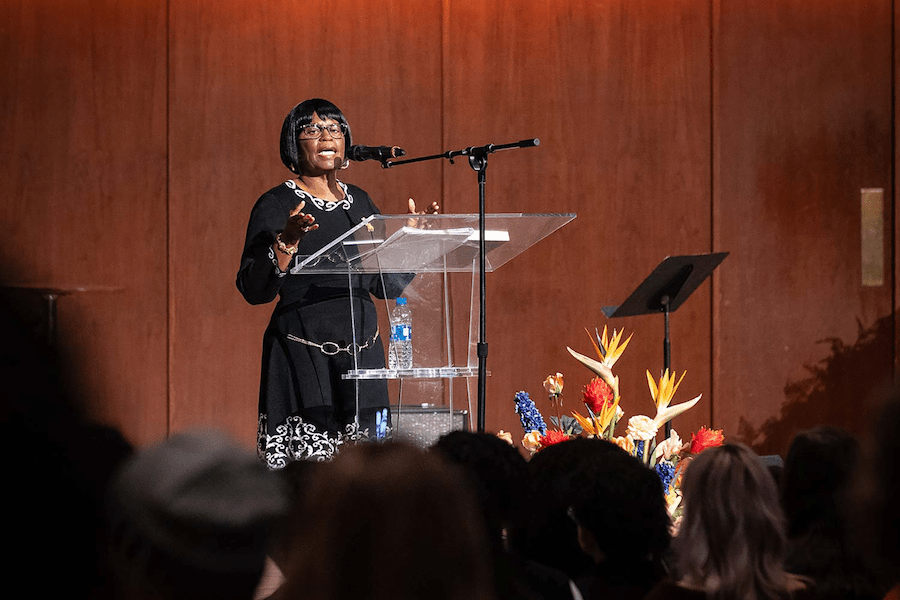
The sisters giggled together as they walked down the avenue to church in their Sunday best. Janie had a new purse, and they tossed it back and forth and laughed some more. Even the gray clouds and autumn wind couldn’t dampen their spirits. It was Youth Day at church, and they would be singing up front in the choir.
Once they arrived, they slipped into the ladies’ lounge in the basement to freshen up before the program. Janie, the oldest, reminded Addie Mae and Sarah to get to their Sunday school class on time.
Then, the room exploded.
Nearly 60 years later, Sarah Collins Rudolph, who, as a little girl, survived one of the darkest days in American Civil Rights history, told her story to Pacific Union College (PUC) students at a special community meeting on January 12 to commemorate Martin Luther King Day. PUC is a Seventh-day Adventist school in Angwin, California, United States.
With her gentle Southern accent, Rudolph told the students about life in Birmingham, Alabama, in the 1960s. She described how the Jim Crow laws prohibited nearly every interaction between Black and White residents — even children playing together. Governor George Wallace declared “segregation forever” in front of the state capitol. Public Safety Commissioner Bull Conner released dogs on a Black youth at a demonstration. And Martin Luther King Jr. organized nonviolent protests against racist state and federal laws.
King and other Civil Rights activists and leaders often met at 16th Street Baptist Church, one of the largest Black churches in Birmingham, through the spring of 1963. They were met with fierce resistance by many.
On September 15, 1963, four young men from an Alabama chapter of the Ku Klux Klan planted at least 15 sticks of dynamite attached to a timing device in the basement of that church. The dynamite sat near the ladies’ lounge, where five girls were getting ready to sing in the choir. At 10:22 a.m., it detonated.
Despite the force of the blast, Rudolph was left standing in the jumble of wreckage around her. But she couldn’t see. First, she called for Jesus, she said. Then her sister.
“Addie! Addie! Addie!” she called.
The Reverend John Cross ran into the now-gaping hole in the basement, scooped Rudolph up in his arms, and took her to an ambulance.
Four girls died in the blast: Denise McNair, 11; Cynthia Wesley, 14; Carole Robertson, 14; and Addie Mae Collins, 14.
Only “the fifth girl,” as she’s often referred to now, survived: 12-year-old Sarah Collins Rudolph.
Rudolph was badly injured but alive. After the horrific event, Life magazine published a photo of her lying in a hospital bed with bandages over both eyes. Her left eye was eventually removed and replaced with a prosthetic eye, and doctors removed 26 shards of glass from her face.
Worst of all, Rudolph told PUC students, was the realization that these girls had died in a safe place — a church.
Rudolph became nervous and fearful of going places. If a car backfired, she’d jump. She’d shake in church.
She said her “nervous condition” carried on for many years. She began to use alcohol and other drugs to try and calm herself.
Janie, her oldest sister, invited her to her church. Rudolph said she was moved by the pastor’s call to repent, be forgiven, and be baptized.
“I had tried the drugs. I had tried the alcohol,” Rudolph recalled. “I might as well try Jesus.”
Later, she said, the pastor called her up on stage to pray for healing for her anxious condition. Rudolph said that after that night, she felt brave enough to be part of church activities up front, including singing in the choir.
“Now,” Rudolph told the PUC students, faculty, and staff, “I can go places. I can talk about Jesus.”
“I had to forgive the men that bombed that church,” she continued. “I carried a lot of hate in my heart for what they did to those girls and myself. So, I forgave them and really started to live my life again.”
PUC senior Keren Castro, a photography major, said she thought it was “encouraging” to hear how “Rudolph went through such a traumatic event but was still able to find peace in her heart and forgive those who did this to her.”
“It was a powerful story that really resonated with the students,” Ryan Smith, PUC vice president of Student Life, said. “It’s one thing to read about these types of histories, it’s another to hear it from the person live, when you can hear and feel the emotions.”
The 16th Street Baptist Church bombing was among the most high-profile events of the Civil Rights era, forcing the United States to reckon with racism. In part, it contributed to the U.S. Congress finally passing the Civil Rights Act of 1964.
The original version of this story was posted on the Pacific Union College news site.